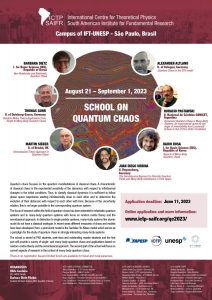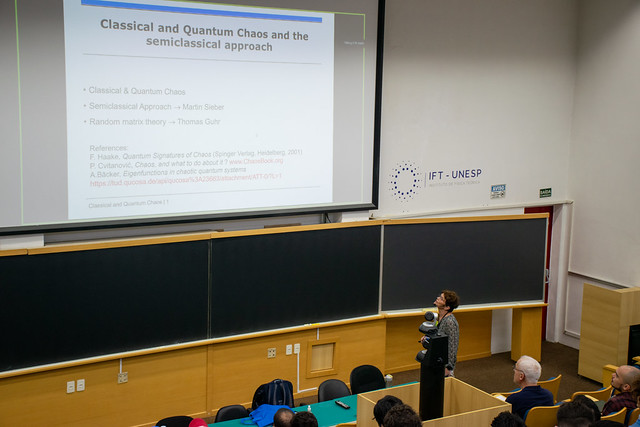School on Quantum Chaos
August 21 – September 1, 2023
São Paulo, Brazil
ICTP-SAIFR/IFT-UNESP
Zoom ID: 867 6788 5360
Zoom password: Quantum

Home
Quantum chaos focuses on the quantum manifestations of classical chaos. A characteristic of classical chaos is the exponential sensitivity of the dynamics with respect to infinitesimal changes in the initial conditions. Thus, to classify classical dynamics it is sufficient to follow phase space trajectories starting infinitesimally close to each other and to determine the evolution of their distances with respect to each other with time. Because of the uncertainty relation, this is no longer possible in the corresponding quantum system.
One important aspect of quantum chaos is the understanding of features of the classical dynamics in terms of the fluctuation properties in the energy spectra of closed quantum systems or of the fluctuations exhibited by the scattering matrix elements describing open ones. The fluctuation properties are predicted to be universal, that is, to be the same for systems belonging to the same universality class and exhibiting the same chaotic behavior in the corresponding classical dynamics and to be describable by random matrix theory. Furthermore, random-matrix models that had been developed for the scattering matrix associated with compound-nuclear reactions have been shown to be applicable to quantum-chaotic scattering processes.
A second important aspect within the field of quantum chaos concerns the semiclassical approach. In this context, one of the most important achievements was the periodic orbit theory pioneered by Gutzwiller, which led to understanding the impact of the classical dynamics on the properties of the quantum system in terms of purely classical quantities.
The focus of research within the field of quantum chaos has been extended to relativistic quantum systems and to many-body quantum systems with focus on random matrix theory and the semiclassical approach. In distinction to single-particle systems, many-body systems like atomic nuclei do not have a classical analogue. In recent years different measures of chaos and models have been developed. Here, a prominent model is the Sachdev-Ye-Kitaev model which serves as a paradigm for the study of quantum chaos in strongly interacting many-body systems.
The school is aimed at PhD students, post-docs and outstanding master students and the first part will provide a survey of single- and many-body quantum chaos and applications based on random-matrix theory and the semiclassical approach. The second part of the school will focus on current aspects of research in the context of many-body quantum chaos.
There is no registration fee and limited funds are available for travel and local expenses.
Organizers:
- Hilda Cerdeira (IFT-UNESP, Brazil)
- Barbara Dietz-Pilatus (Institute for Basic Science (IBS), Republic of Korea)
List of participants: Updated on August 24, 2023
Satisfaction Survey: Here
Lecturers
- Barbara Dietz (Institute for Basic Science (IBS), Republic of Korea): Non-Relativistic and Relativistic Quantum Chaos
- Thomas Guhr (University of Duisburg-Essen, Germany): Random Matrix Theory Applications from Single to Many-Body Quantum Chaos
- Martin Sieber (University of Bristol, UK): Semiclassical Theory Approach in Quantum Chaos
Second week – Review of aspects of many-body quantum chaos and the main models:
- Alexander Altland (University of Cologne, Germany): Quantum Chaos in the SYK model
- Horacio Pastawski (Universidad Nacional de Córdoba-CONICET, Argentina): Dynamical Quantum Chaos in Many-Body Systems: An experimental quest for the origin of irreversibility from Loschmidt Echoes to Out of Time Order Correlators
- Dario Rosa (Institute for Basic Science (IBS), Republic of Korea): Aspects of Many-Body Quantum Chaos
- Juan Diego Urbina (University Regensburg, Institute for Theoretical Physics, Germany): The Semiclassical Approach to Discrete Quantum Fields and Many-Body Interference in Fock Space
Reading Materials: Here
Registration
Program
Download program: updated – August 28
Student Talks
Friday (August 25), 11:30:
- 1. Ju-Yeon Gyhm: The Quantum Fisher Information of many-body systems
- 2. Ricardo Batista do Carmo: Quantization in Chaotic Billiards With Discrete Rotational Symmetry
- 3. Tiago Araújo de Paula Lima: Classical and Quantum Elliptical Billiards: Mixed Phase Space and Short Correlations in Singlets and Doublets
- 4. Pedro Henrique Santos Bento: Quantum transport in chaotic cavities with tunnel barriers
- 5. Washington Santos: Incoherent transport due to electron-electron interaction in disordered graphene nanoribbons
- 6. Ivana Ribeiro: Thermodynamic uncertainty relations in mesoscopic devices
Friday (August 25), 15:00:
- 7. Alessandra Chioquetta: Quantum many-body scars on the PXP model and beyond
- 8. Leonard Logaric: Weak Ergodicity Breaking in Dual Unitary Circuits
- 9. David Villasenor: Chaos in a dissipative spin-boson model
- 10. Miguel de Jesús González Martínez: Multifractal aspects of the Quantum Kicked Top model
- 11. WILLIAM ESTEBAN SALAZAR ESTRADA: On a matrix ensemble for arbitrary complex quantum systems
- 12. Gastón Scialchi: Quantum chaos in Krylov space
Format: 12 Min talk + 3 Minutes Questions
Videos and Files
- 09:30 - Barbara Dietz (Institute for Basic Science (IBS), Republic of Korea): Non-Relativistic and Relativistic Quantum Chaos Class 01 of 03
- 11:30 - Thomas Guhr (University of Duisburg-Essen, Germany): Random Matrix Theory Applications from Single to Many-Body Quantum Chaos Class 01 of 03
- 09:30 - Barbara Dietz ( Institute for Basic Science (IBS), Republic of Korea): Non-Relativistic and Relativistic Quantum Chaos Class 02 of 03
- 11:30 - Martin Sieber ( University of Bristol, UK): Semiclassical Theory Approach in Quantum Chaos Class 01 of 03
- 09:30 - Martin Sieber ( University of Bristol, UK): Semiclassical Theory Approach in Quantum Chaos Class 02 of 03
- 11:30 - Thomas Guhr (University of Duisburg-Essen, Germany): Random Matrix Theory Applications from Single to Many-Body Quantum Chaos Class 02 of 03
- 14:00 - Barbara Dietz (BS Center for Theoretical Physics of Complex Systems): Experiments with Superconducting Microwave ResonatorsSimulating Artificial Graphene
- 09:30 - Barbara Dietz ( Institute for Basic Science (IBS), Republic of Korea): Non-Relativistic and Relativistic Quantum Chaos Class 03 of 03
- 11:30 - Thomas Guhr (University of Duisburg-Essen, Germany): Random Matrix Theory Applications from Single to Many-Body Quantum Chaos Class 03 of 03
-
09:30 - Martin Sieber (University of Bristol, UK):
Semiclassical Theory Approach in Quantum Chaos Class 03 of 03
-
09:30 - Juan Diego Urbina (University Regensburg, Institute for Theoretical Physics, Germany):
The Semiclassical Approach to Discrete Quantum Fields and Many-Body Interference in Fock Space - Class 01 of 03
-
11:30 - Juan Diego Urbina (University Regensburg, Institute for Theoretical Physics, Germany):
The Semiclassical Approach to Discrete Quantum Fields and Many-Body Interference in Fock Space - Class 02 of 03
- 15:00 - Horacio Pastawsk (Universidad Nacional de Córdoba-CONICET, Argentina): Dynamical Quantum Chaos in Many-Body Systems: An experimental quest for the origin of irreversibility from Loschmidt Echoes to Out of Time Order Correlators - Class 01 of 03
- 09:30 - Juan Diego Urbina (University Regensburg, Institute for Theoretical Physics, Germany): The Semiclassical Approach to Discrete Quantum Fields and Many-Body Interference in Fock Space - Class 03 of 03
-
11:30 - Horacio Pastawsk (Universidad Nacional de Córdoba-CONICET, Argentina):
Dynamical Quantum Chaos in Many-Body Systems: An experimental quest for the origin of irreversibility from Loschmidt Echoes to Out of Time Order Correlators - Class 02 of 03
-
09:30 - Dario Rosa (Institute for Basic Science (IBS), Republic of Korea):
Aspects of Many-Body Quantum Chaos - Class 01 of 03
-
11:30 - Alexander Altland (University of Cologne, Germany):
Quantum Chaos in the SYK model - Class 01 of 03
- 14:00 - Gabriel Carlo (CNEA-CONICET): Majorization-optimized quantum machine learning
-
09:30 - Horacio Pastawsk (Universidad Nacional de Córdoba-CONICET, Argentina):
Dynamical Quantum Chaos in Many-Body Systems: An experimental quest for the origin of irreversibility from Loschmidt Echoes to Out of Time Order Correlators - Class 03 of 03
-
11:30 - Alexander Altland (University of Cologne, Germany):
Quantum Chaos in the SYK model - Class 02 of 03
-
15:00 - Dario Rosa (Institute for Basic Science (IBS), Republic of Korea):
Aspects of Many-Body Quantum Chaos - Class 02 of 03
-
09:30 - Dario Rosa (Institute for Basic Science (IBS), Republic of Korea):
Aspects of Many-Body Quantum Chaos - Class 03 of 03
-
11:30 - Alexander Altland (University of Cologne, Germany):
Quantum Chaos in the SYK model - Class 03 of 03
asdasdasd
Poster Presentation
- Adair Campos Uscanga (Universidad Veracruzana): The Efficient Coherent Basis in quantum chaos and the importance of choosing the correct basis
- Felipe Gewers (Instituto de Física da Universidade de São Paulo – IFUSP): Development of a quantum channel between rubidium atoms D1 line and telecommunications’ L-band
- Gaspar Aníbal Gonzalez Acosta (Facultad de Ciencias Exactas/Universidad Nacional de La Plata): Classical Limit, Quantum Border and Energy
- Guilherme Ilario Correr (Instituto de Física de São Carlos – Universidade de São Paulo): Characterization of parameterized quantum circuits using tools from quantum information theory
- JESUS ALFONSO SEGURA LANDA (Universidad Veracruzana): Resonances in the kicked LMG model
- Joaquim de Miranda Telles de Miranda (Centro Brasileiro de Pesquisas Físicas): Subsystem trace distances of random states
- Maedeh Rezaei (Institute for Theoretical physics University of Cologne-THP): Investigating Gravity as a Quantum Chaotic System
- Maika MATOGAWA: Bistability of Chiral Lasing States in an Asymmetric 2D Microcavity Laser
- Martin Daniel Jimenez (Instituto de Física Enrique Gaviola, Consejo Nacional de Investigaciones Científicas y Técnicas, Argentina): Two interacting fermionic pairs in a one-dimensional trap: a composite-boson approach
- Pablo Daniel Bergamasco (National Atomic Energy Commission – CNEA): Quantum Lyapunov exponent in dissipative systems
- Viani Suhail Morales Guzmán (Instituto de Ciencias Nucleares, Universidad Nacional Autónoma de México): A Comment on “Algebraic approach to the Tavis-Cummings model with three modes of oscillation” [J. Math. Phys. 59, 073506 (2018) ]
- Weihua Zhang (Institute for Basic Science and Lanzhou University): Thermalization Universality Class Transition Induced by Disorder’
The posters will be on display from the August 21 to September 1 on mezzanine level.
For details about the poster presentation, please, look at the correspondent Additional Information topic.
Photos
Additional Information
BOARDING PASS: All participants, whose travel has been provided or will be reimbursed by ICTP-SAIFR, should bring the boarding pass upon registration. The return boarding pass (PDF, if online check-in, scan or picture, if physical) should be sent to secretary@ictp-saifr.org by e-mail.
COVID-19: Brazilians and foreigners no longer have to present proof of vaccination before entering the country.
Visa information: Nationals from several countries in Latin America and Europe are exempt from tourist visa. Nationals from Australia, Canada, Japan and USA are exempt from tourist visa until October 1st, 2023. Please check here which nationals need a tourist visa to enter Brazil.
Accommodation: Participants, whose accommodation will be provided by the institute, will stay at The Universe Flat. Hotel recommendations are available here
How to reach the Institute: The school will be held at ICTP South American Institute, located at IFT-UNESP, which is across the street from a major bus and subway terminal (Terminal Barra Funda). The address which is closer to the entrance of the IFT-UNESP building is R. Jornalista Aloysio Biondi, 120 – Barra Funda, São Paulo. The easiest way to reach us is by subway or bus, please find instructions here.
Poster presentation: Participants who are presenting a poster MUST BRING A BANNER PRINTED. The banner size should be at most 1 m (width) x 1,5 m (length). We do not accept A4 or A3 paper. Click here to see what a banner looks like: http://designplast.ind.br/produtos/detalhe/impressao-digital/banner/119/9

